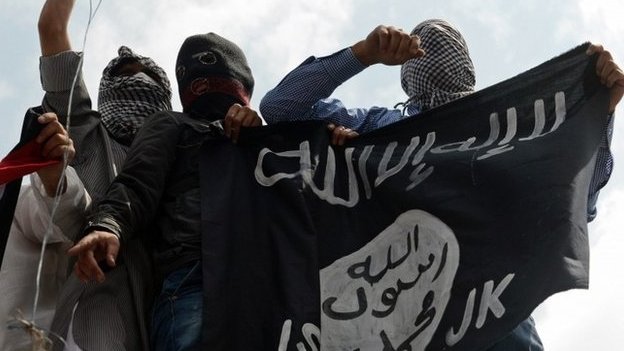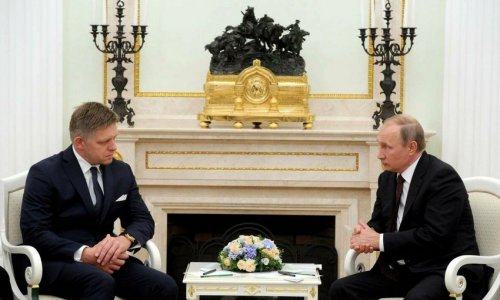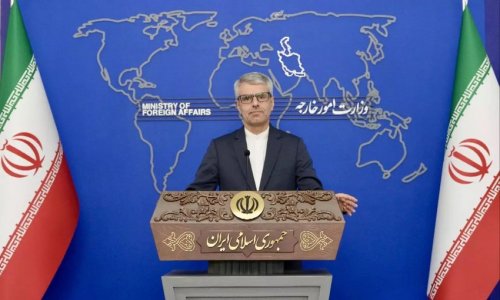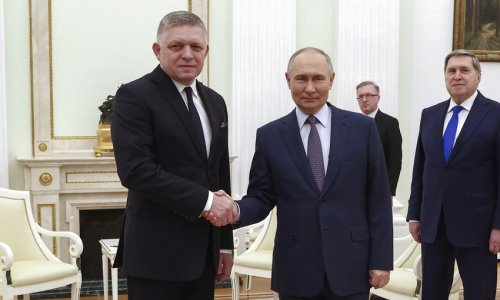It was Voltaire who said that the Holy Roman Empire was neither holy, nor Roman, nor an empire.
Some would say the same of Islamic State (IS) - that it is neither Islamic, nor a state.
I suspect that is unhelpful sophistry, which disguises the scale of the challenge to the West.
One of IS main slogans is: "Remaining and expanding." For those who would rather it contracted and faded, figuring out its nature should be a priority.
At the moment, the West seems deeply uncertain about what to do.
Back in August, US President Barack Obama declared that "we have no strategy yet" to deal with IS.
Later he ordered air strikes against IS in Iraq and Syria.
So, he now has a policy. It is not clear that it amounts to a strategy.
Troops on the ground
On the World this Weekend, I spoke to the former four-star general Jack Keane, who was instrumental in the "surge" that beat down the Sunni insurgency after the invasion of Iraq.
He told me: "The strategy is likely to fail. We need to put advisers on the ground with the [Iraqi] troops who are going to fight. Air-ground controllers as well.
"We have to increase their air power to support them - apache helicopters."
I put it to him that was worrying language that would remind everyone of "mission creep" and Vietnam.
He said: "It needs to have mission creep - a lot of mission creep to be frank.
"I mean the issue is - do you want to destroy and defeat it, or do you want to lose? We are on a path to failure."
A few days after that conversation, the US announced 1,500 more advisers would be sent to Iraq, on top of the 3,000 already heading there.
This was decided at one of the two conferences held last week on the threat of IS, one in Brussels, the other in Bahrain.
At both, there was general agreement that IS could not be defeated by military force alone.
That is why understanding its ideology is important.
The question of whether IS is Islamic is controversial.
It is understandable why the vast majority of Muslims who have rejected this brand of extremism want to say it is un-Islamic.
It is equally obvious why politicians in the West want to agree with them, to draw a very clear distinction between murderous fanatics and the religion of law-abiding millions.
But it is a bit like saying the Inquisition or those Protestants who burnt Catholics at the stake (or vice versa) were not Christian.
For theologians, this may make sense. "Would Jesus want this?" might be their question.
But for the rest of us it is claptrap - these killers were not motivated by Buddhism, or Marxism or vegetarianism, but by their own interpretation of Christianity.
So with IS - it is the current apex of a century or more trend towards ever more violent jihadist movements with deep religious and historical roots.
Over the years, not only has the brutality of such movements grown, but their definition of legitimate targets has also ballooned.
From warily deciding that conspicuously secular rulers of Muslim populations could be overthrown by violence, it has grown to include terrorist attacks on security forces, to any servants of the state, to any citizen who doesn't oppose their own rulers, and now to any Muslim anywhere who doesn't join the struggle.
The definition of "takfir" - declaring someone a heretic - has grown exponentially. Although this article is a few years old, it sets out the argument very clearly.
End of times
Some argue that the West, perhaps understandably obsessed by the threat of another 9/11 and the fight against al-Qaeda, has misinterpreted the nature of IS, which is motivated by sectarian hatred of Shias and a desire to dominate the region.
Author Ahmed Rashid says: "The first thing we need to recognise is that IS is not waging a war against the West."
He adds: "Arab regimes need to come together far more than they have done if they are to convince their populations that the extremism carried out by IS in the name of Sunni Islam is destroying the traditional, tolerant Islam that most Arabs have always believed in."
The analysis may be spot on, but it also highlights a huge problem.
The very origins of IS make it much more difficult for the biggest players in the region to act decisively - or indeed want to do so.
In a brilliant piece, Karen Armstrong argues the violent, intolerant 18th Century Wahabism that gave rise to IS also created Saudi Arabia - down to the tactics of beheading enemies and treating women and children as legitimate targets.
There are those who argue that ideology is even more fundamental to understanding the actions of IS because it is motivated by an "end of times" narrative and is acting to bring about "malahim" - the equivalent of Armageddon.
Certainly their glossy, high-production value, lyrical magazine is called "Dabiq" after a Syrian town where prophesies predict that the final battle will be fought: "The hour will not be established until the Romans land at al-A'maq or Dabiq."
IS clearly identify the Americans with 'the dogs of Rome" - the modern imperialists - and some argue that the obscenity of the beheading of hostages is designed deliberately to lure the US into a ground fight to establish the conditions for the prophecy to be fulfilled.
While this is an interesting theory, it is perhaps too alluring - there is more support for it in the tabloid press that among reputable scholars.
Deliberately divisive
But there is no doubt that the IS deliberately cultivates a sense of a world approaching an apocalyptic clash where, as former US President George W Bush said, you are either with us, or against us.
It is possible that in its deliberately divisive, aggressive challenge to any Muslim not willing to actively support it, IS is sowing the seeds of its own destruction.
But it is also part of its appeal to disaffected radicals in the West and elsewhere.
Its ambition, is to rule the whole world. But is it more than a terrorist organisation with grandiose ambition?
IS controls large parts of Iraq and Syria, probably amounting to an area roughly the size of Great Britain.
The self-anointed caliph Abu Bakr al-Baghdadi runs a bureaucracy headed by an eight-man cabinet, including six provincial governors.
Aman Jawad al-Tamimi, who works for the US-based Middle East Forum, has no doubt it is "a state and has to be treated as such".
"That doesn't mean giving it recognition, but they have all the trappings of a state in how they run localities," he says.
"You can identify departments of government across IS-controlled areas.
"Health departments, real estate, Sharia committees, public service committees - all the trappings of a state, however poor it might be in reality."
To many it may seem that that this terrorist organisation claiming to be a new country exploded on the scene almost out of nowhere - to claim an area straddling two countries. Known by a confusing plethora of names - ISI, ISIS, ISIL Islamic state in Iraq, and Islamic State.
Very different movement
It certainly evolved out of a conventional terrorist outfit - a Sunni group formed by Jordanian Abu Musab al-Zarqawi in Afghanistan in 1999.
After the American invasion, they fled to Iraq - and, in 2004, pledged allegiance to Osama Bin Laden and became known as al-Qaeda in Iraq, developing a reputation of sectarian brutality towards the Shia minority - Zarqawi called them the "lurking snake, the crafty and malicious scorpion".
(BBC)
ANN.Az
Follow us !











